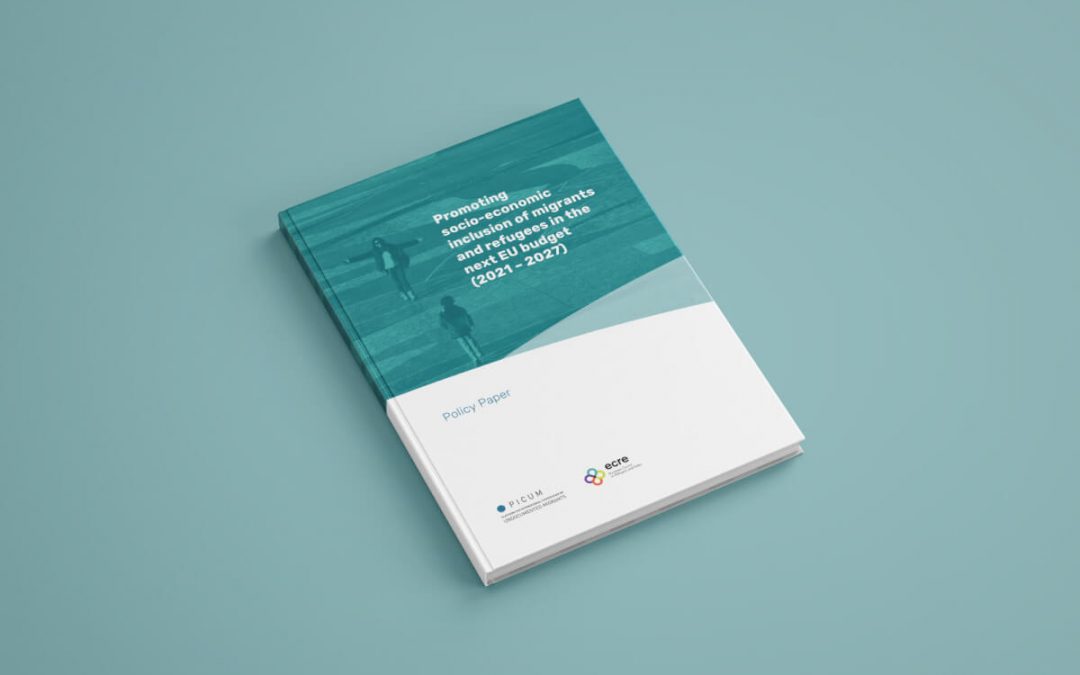The paper argues that the next long term budget of the EU must provide an adequate amount of funding to support the integration policies of EU member states and deliver effectively on the main priorities set up in the EU Action Plan for Integration of the Third Country Nationals. For this reason, ECRE and PICUM recommended an allocation requirement of at least 30% for spending in social inclusion and 4% for actions addressing material deprivation within the European Social Fund + (ESF+). To provide adequate resources for early integration measures, at least 30% of the resources should be allocated and spent by member states on integration within the Asylum and Migration Fund (AMF).
To allow all TCNs to successfully integrate, it is essential to avoid discrimination among recipients of inclusion measures by ensuring that such measures reach the widest target group possible. Applying an approach strictly based on residence status risks undermining successful integration. Regularisation campaigns and initiatives, both at local and national level, should be supported by EU funding, as they constitute an effective means to reduce irregular migration and effectively tackle unreported employment and socio-economic exclusion.
The paper also makes the case for allowing civil society organisations and social partners to access funding which ensures their expertise in integration is capitalised on, which ultimately leads to a better allocation of resources. To allow smaller organisations to access resources from both AMF and ESF+, it is important to simplify EU funding rules, align administrative requirements for different programmes and reduce burdensome procedures, which may discourage or make it impossible for smaller actors to apply for grants. ECRE and PICUM warmly welcome the proposal of 90% co-financing rate for integration related work in AMF thematic facility, and call for a similar approach in other funds.
Among other target groups of ESF+, TCNs present several vulnerabilities, which makes them qualify as a disadvantaged group. TCNs are 20% more likely than EU nationals to be at risk of poverty, and have, in average, a significantly lower income. Specific attention to intersecting forms of discrimination need to be taken into account when formulating social inclusion policies so that children, women, LGBTI individuals, religious or ethnic minorities within a certain nationality, elderly people and people with disabilities do not face further disadvantages.
Despite having a multitude of skills, migrant women are usually confined to occupations such as cleaning, catering, domestic work, health and social care. These jobs may be low paid, have poor working conditions and tend to limit social inclusion opportunities. ECRE and PICUM therefore argue that inclusion policies cannot be gender-neutral: besides the general promotion of gender equality, operative programmes delivering on inclusion need to take into account these specificities, and design tailored services to ensure the promotion of equal opportunities between men and women within the context of migration, within the scope of all the funds involved.
For further information:
- ECRE/PICUM, position on the proposal for a regulation of the European Social Fund + 2021-2027, November 2018
- ECRE/UNHCR, The way Forward – A comprehensive study of the new proposals for EU funds on Asylum, Migration an Itegration, October 2018
- ECRE comments On The European Commission Proposal On The Asylum And Migration Fund (AMF),September 2018
- ECRE Policy Note, the Price of Rights: Asylum and EU Internal Funding – ECRE’s Preliminary Analysis of the Commission’s Proposal for the Multi-Annual Financial Framework 2021-2027: Funding within the EU and at its Borders, June 2018
This article appeared in the ECRE Weekly Bulletin . You can subscribe to the Weekly Bulletin here.

